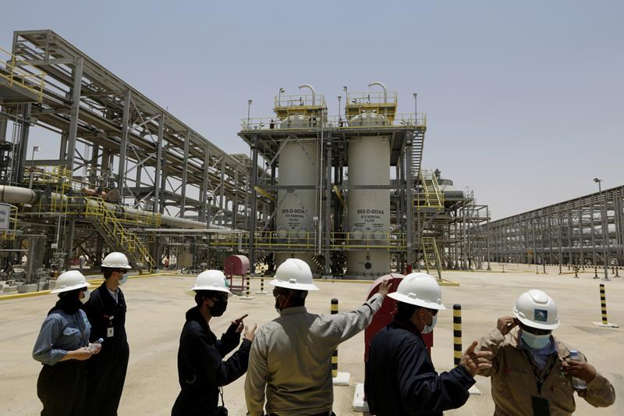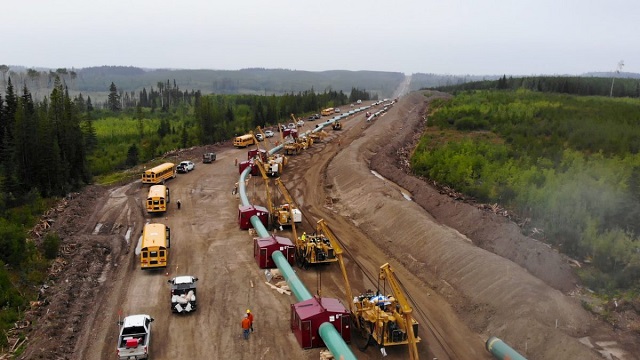Economy
Key energy agencies diverge as demand and oil prices climb

DUBAI, United Arab Emirates (AP) — Leaders of the world’s most consequential energy bodies gathered for a forum Wednesday to discuss the uncertain future of oil as demand rebounds and prices climb, all while a growing roster of nations pledge to transition to cleaner forms of energy.
The forum, which included speakers from the Organization of Petroleum Exporting Countries, the International Energy Agency and the International Energy Forum, presented varying forecasts for oil demand and discussed energy security and market stability.
Yet from the outset, the wider debate on how the world should best transition away from so-called dirty fuels and other sources of carbon emissions that pollute the air played out as speakers gave their remarks.
Major oil-producing nations, like Saudi Arabia and the United Arab Emirates, have long argued that a rapid energy transition away from the fossil fuels that they continue to rely on for revenue will impact global economic growth and hurt the world’s poorest. Those backing a fast-tracked transition insist new investments in energy must go toward expanding existing wind and solar solutions and in funding innovative solutions if the world is to avoid catastrophic global warming levels. On both sides, however, there is agreement that the world is far from reaching sustainable targets as demand for energy grows.
“We are not on track. So how should policy makers respond to this dilemma? The reality is that 80% of the world’s energy needs continue to be met by fossil fuels,” said Joseph McMonigle, secretary general of the Saudi-based International Energy Forum that hosted the symposium. The IEF is the largest organization of energy ministers, with 71 member states, including the United States.
McMonigle said global energy demand has “roared back” to pre-pandemic levels, but that investments in oil and gas are not back to where they were before the COVID-19 crisis.
“Disinvestment in energy supply will not deliver a just and orderly transition and cannot be a response to the climate crisis,” he said, arguing that countries should invest in both greener forms of energy as well as fossil fuels.
The IEF has called for oil and gas investment to reach $525 billion through 2030 to ensure “market balance” despite a slowdown projected in how much demand for oil will grow. The group notes that investment in the oil and gas sector in 2021 stood at $341 billion. Without more financing, the IEF says demand could outstrip future supply within the next five to six years. They say it could also result in switching to more polluting energy sources such as wood and coal.
Others disagree. The International Energy Agency’s executive director has said the world does not need more investments in new oil, gas and coal projects.
From Paris, the IEA’s Fatih Birol did not directly address the comments made by McMonigle, but he echoed the sentiment that the energy transition must happen in an “orderly manner” so that climate targets are met and oil producing economies are seen as part of the solution.
To meet these targets, the world must reduce its consumption of fossil fuels, Birol said, before later adding: “We cannot drop oil and gas tomorrow.”
“The world will need oil and gas for several years to come. However, if we want to reach our climate targets we would need less oil and less coal and less gas than we use today in an unabated format.”
The IEA says that for the world to reach net-zero emissions by 2050, annual clean energy investment worldwide will need to more than triple by 2030 to around $4 trillion. It has also called out the energy sector as the source of around 75% of greenhouse gas emissions, a main driver in climate change.
The IEA estimates that world oil demand is set to expand by 3.2 million barrels per day this year, reaching 100.6 million barrels per day as restrictions to contain the spread of the coronavirus ease. Benchmark crude prices rose by more than 15% in January to cross the $90 per barrel threshold for the first time in more than seven years.
The rebound in demand for oil, combined with a shortfall in energy investments, rising prices and market uncertainty has led to varying energy outlook scenarios. The diverging outlooks by OPEC, the IEF, IEA and others have an impact on how governments choose to formulate their energy policies and decide on production levels as they commit to net-zero pledges.
___
Follow Aya Batrawy on Twitter at www.twitter.com/ayaelb
___
Follow AP’s climate coverage at http://apnews.com/hub/climate
Aya Batrawy, The Associated Press
Business
Large-scale energy investments remain a pipe dream

I view the recent announcements by the Government of Canada as window dressing, and not addressing the fundamental issue which is that projects are drowning in bureaucratic red tape and regulatory overburden. We don’t need them picking winners and losers, a fool’s errand in my opinion, but rather make it easier to do business within Canada and stop the hemorrhaging of Foreign Direct Investment from this country.
Thanks for reading William’s Substack!
Subscribe for free to receive new posts and support my work.
Changes are afoot—reportedly, carve-outs and tweaks to federal regulations that would help attract investment in a new oil pipeline from Alberta. But any private proponent to come out of this deal will presumably be handpicked to advance through the narrow Bill C-5 window, aided by one-off fixes and exemptions.
That approach can only move us so far. It doesn’t address the underlying problem.
Anyone in the investment world will tell you a patchwork of adjustments is nowhere near enough to unlock the large-scale energy investment this country needs. And from that investor’s perspective, the horizon stretches far beyond a single political cycle. Even if this government promises clarity today in the much-anticipated memorandum of understanding (MOU), who knows whether it will be around by the time any major proposal actually moves forward.
With all of the talk of “nation-building” projects, I have often been asked what my thoughts are about what we must see from the federal government.
The energy sector is the file the feds have to get right. It is by far the largest component of Canadian exports, with oil accounting for $147 billion in 2024 (20 percent of all exports), and energy as a whole accounting for $227 billion of exports (30 percent of all exports).
Furthermore, we are home to some of the largest resource reserves in the world, including oil (third-largest in proven reserves) and natural gas (ninth-largest). Canada needs to wholeheartedly embrace that. Natural resource exceptionalism is exactly what Canada is, and we should be proud of it.
One of the most important factors that drives investment is commodity prices. But that is set by market forces.
Beyond that, I have always said that the two most important things one considers before looking at a project are the rule of law and regulatory certainty.
The Liberal government has been obtuse when it comes to whether it will continue the West Coast tanker ban (Bill C-48) or lift it to make way for a pipeline. But nobody will propose a pipeline without the regulatory and legal certainty that they will not be seriously hindered should they propose to build one.
Meanwhile, the proposed emissions cap is something that sets an incredibly negative tone, a sentiment that is the most influential factor in ensuring funds flow. Finally, the Impact Assessment Act, often referred to as the “no more pipelines bill” (Bill C-69), has started to blur the lines between provincial and federal authority.
All three are supposedly on the table for tweaks or carve-outs. But that may not be enough.
It is interesting that Norway—a country that built its wealth on oil and natural gas—has adopted the mantra that as long as oil is a part of the global economy, it will be the last producer standing. It does so while marrying conventional energy with lower-carbon standards. We should be more like Norway.
Rather than constantly speaking down to the sector, the Canadian government should embrace the wealth that this represents and adopt a similar narrative.
The sector isn’t looking for handouts. Rather, it is looking for certainty, and a government proud of the work that they do and is willing to say so to Canada and the rest of the world. Foreign direct investment outflows have been a huge issue for Canada, and one of the bigger drags on our economy.
Almost all of the major project announcements Prime Minister Mark Carney has made to date have been about existing projects, often decades in the making, which are not really “additive” to the economy and are reflective of the regulatory overburden that industry faces en masse.
I have always said governments are about setting the rules of the game, while it is up to businesses to decide whether they wish to participate or to pick up the ball and look elsewhere.
Capital is mobile and will pursue the best risk-adjusted returns it can find. But the flow of capital from our country proves that Canada is viewed as just too risky for investors.
The government’s job is not to try to pick winners and losers. History has shown that governments are horrible at that. Rather, it should create a risk-appropriate environment with stable and capital-attractive rules in place, and then get out of the way and see where the chips fall.
Link to The Hub article: Large-scale energy investments remain a pipe dream
Formerly the head of institutional equity research at FirstEnergy Capital Corp and ATB Capital Markets. I have been involved in the energy sector in either the sell side or corporately for over 25 years
Thanks for reading William’s Substack!
Subscribe for free to receive new posts and support my work.
Business
Will the Port of Churchill ever cease to be a dream?

From Resource Works
The Port of Churchill has long been viewed as Canada’s northern gateway to global markets, but decades of under-investment have held it back.
A national dream that never materialised
For nearly a century, Churchill, Manitoba has loomed in the national imagination. In 1931, crowds on the rocky shore watched the first steamships pull into Canada’s new deepwater Arctic port, hailed as the “thriving seaport of the Prairies” that would bring western grain “1,000 miles nearer” to European markets. The dream was that this Hudson Bay town would become a great Canadian centre of trade and commerce.
The Hudson Bay Railway was blasted across muskeg and permafrost to reach what engineers called an “incomparably superior” harbour. But a short ice free season and high costs meant Churchill never grew beyond a niche outlet beside Canada’s larger ports, and the town’s population shrank.
False starts, failed investments
In 1997, Denver based OmniTrax bought the port and 900 kilometre rail line with federal backing and promises of heavy investment. Former employees and federal records later suggested those promises were not fully kept, even as Ottawa poured money into the route and subsidies were offered to keep grain moving north. After port fees jumped and the Canadian Wheat Board disappeared, grain volumes collapsed and the port shut, cutting rail service and leaving northern communities and miners scrambling.
A new Indigenous-led revival — with limits
The current revival looks different. The port and railway are now owned by Arctic Gateway Group, a partnership of First Nations and northern municipalities that stepped in after washouts closed the line and OmniTrax walked away. Manitoba and Ottawa have committed $262.5 million over five years to stabilize the railway and upgrade the terminal, with Manitoba’s share now at $87.5 million after a new $51 million provincial pledge.
Prime Minister Mark Carney has folded Churchill into his wider push on “nation building” infrastructure. His government’s new Major Projects Office is advancing energy, mining and transmission proposals that Ottawa says add up to more than $116 billion in investment. Against that backdrop, Churchill’s slice looks modest, a necessary repair rather than a defining project.
The paperwork drives home the point. The first waves of formally fast tracked projects include LNG expansion at Kitimat, new nuclear at Darlington and copper and nickel mines. Churchill sits instead on the office’s list of “transformative strategies”, a roster of big ideas still awaiting detailed plans and costings, with a formal Port of Churchill Plus strategy not expected until the spring of 2026 under federal–provincial timelines.
Churchill as priority — or afterthought?
Premier Wab Kinew rejects the notion that Churchill is an afterthought. Standing with Carney in Winnipeg, he called the northern expansion “a major priority” for Manitoba and cast the project as a way for the province “to be able to play a role in building up Canada’s economy for the next stage of us pushing back against” U.S. protectionism. He has also cautioned that “when we’re thinking about a major piece of infrastructure, realistically, a five to 10 year timeline is probably realistic.”
On paper, the Port of Churchill Plus concept is sweeping. The project description calls for an upgraded railway, an all weather road, new icebreaking capacity in Hudson Bay and a northern “energy corridor” that could one day move liquefied natural gas, crude oil, electricity or hydrogen. Ottawa’s joint statement with Manitoba calls Churchill “without question, a core component to the prosperity of the country.”
Concepts without commitments
The vision is sweeping, yet most of this remains conceptual. Analysts note that hard questions about routing, engineering, environmental impacts and commercial demand still have to be answered. Transportation experts say they struggle to see a purely commercial case that would make Churchill more attractive than larger ports, arguing its real value is as an insurance policy for sovereignty and supply chain resilience.
That insurance argument is compelling in an era of geopolitical risk and heightened concern about Arctic security. It is also a reminder of how limited Canada’s ambition at Churchill has been. For a hundred years, governments have been willing to dream big in northern Manitoba, then content to underbuild and underdeliver, as the port’s own history of near misses shows. A port that should be a symbol of confidence in the North has spent most of its life as a seasonal outlet.
A Canadian pattern — high ambition, slow execution
The pattern is familiar across the country. Despite abundant resources, capital and engineering talent, mines, pipelines, ports and power lines take years longer to approve and build here than in competing jurisdictions. A tangle of overlapping regulations, court challenges and political caution has turned review into a slow moving veto, leaving a politics of grand announcements followed by small, incremental steps.
Churchill is where those national habits are most exposed. The latest round of investment, led by Indigenous owners and backed by both levels of government, deserves support, as does Kinew’s insistence that Churchill is a priority. But until Canada matches its Arctic trading rhetoric with a willingness to build at scale and at speed, the port will remain a powerful dream that never quite becomes a real gateway to the world.
Headline photo credit to THE CANADIAN PRESS/John Woods
-

 Energy1 day ago
Energy1 day agoExpanding Canadian energy production could help lower global emissions
-

 Great Reset2 days ago
Great Reset2 days agoEXCLUSIVE: The Nova Scotia RCMP Veterans’ Association IS TARGETING VETERANS with Euthanasia
-

 Business1 day ago
Business1 day agoWill the Port of Churchill ever cease to be a dream?
-

 Daily Caller2 days ago
Daily Caller2 days agoSpreading Sedition? Media Defends Democrats Calling On Soldiers And Officers To Defy Chain Of Command
-

 COVID-192 days ago
COVID-192 days agoCovid Cover-Ups: Excess Deaths, Vaccine Harms, and Coordinated Censorship
-

 Bruce Dowbiggin2 days ago
Bruce Dowbiggin2 days agoBurying Poilievre Is Job One In Carney’s Ottawa
-

 Health2 days ago
Health2 days agoDisabled Canadians petition Parliament to reverse MAiD for non-terminal conditions
-

 Business1 day ago
Business1 day agoThe numbers Canada uses to set policy don’t add up






